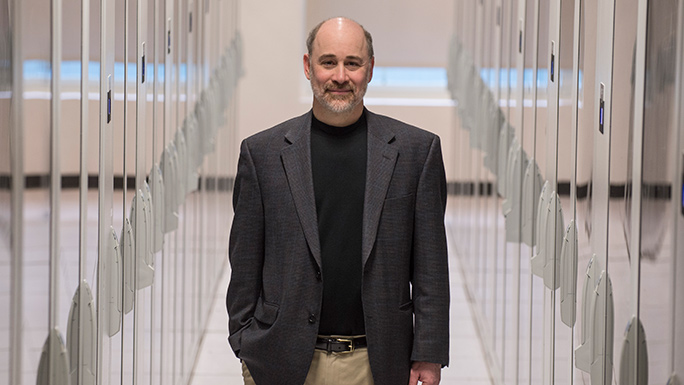Big Data
In the current era of personalized medicine and precision oncology, genomic information holds the key to developing novel and more effective cancer therapies. And, recent technological advances have led to massive amounts of genomic data being collected from thousands of tumors and dozens of cancer types. However, the lack of tools and resources to efficiently handle, process, analyze and share large genomic datasets presents a significant barrier to capitalizing on these data and realizing the promise of personalized medicine. The University of Chicago is a national leader in overcoming these challenges.
The University of Chicago Medicine Comprehensive Cancer Center continues to lead national efforts in using cancer bioinformatics and cloud computing to get an in-depth view of cancer genomics, epigenetics, proteomics, and gene expression. These data are allowing cancer researchers to get an unprecedented glimpse into the inner workings of cancer and helping to identify promising molecular targets at an accelerated pace.
National Genomic Data Initiatives
The National Cancer Institute (NCI) Genomic Data Commons housed at UChicago and led by Robert Grossman, PhD, provides an invaluable resource to the international cancer research community, containing more than 14 petabytes of data accessed by more than 20,000 users per month.

An extension of this effort focused exclusively on childhood cancer, also being developed at the University of Chicago, is the Pediatric Cancer Data Commons. Given the rarer nature of pediatric cancer and the need to compile and share data from across the globe, this will serve as a critical resource for improving risk classification, treatment, and survivorship for childhood cancer.
Project GENIE (Genomics Evidence Neoplasia Information Exchange) is another national genomic data initiative now involving the Comprehensive Cancer Center. Led by the American Association for Cancer Research (AACR), Project GENIE is centralizing clinical-grade genomic and clinical outcomes data from 19 institutions, including the University of Chicago. After the fifth public data release from GENIE, in January 2019, the database includes nearly 60,000 de-identified genomic records from patients treated at the consortium’s institutions.
Radiomics
Like genomic data, imaging data hold extraordinary power to better understand and “see” cancer more closely. One of the world’s experts in incorporating imaging data with other cancer clinical features — a field called radiomics — is Maryellen Giger, PhD. Giger’s team has created innovative computational and bioinformatics approaches to better classify breast cancers and distinguish between benign and malignant tumors.
